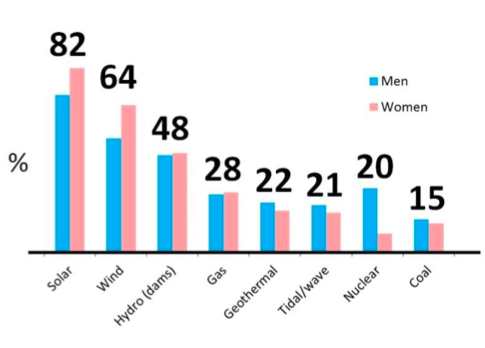The ongoing political fights over climate and clean energy policies have led many to see climate change as an ideological issue. Pollsters tend to reinforce this by breaking down surveys by voting intention. But as the latest iteration of our comprehensive survey of Australian attitudes, Climate of the Nation 2014, shows, a less visible but important distinction is the gender gap.
Whether they’re assessing climate science, the risks and costs of climate impacts or the composition of the energy supply, women have a solid lead on men.
For example, our survey found that most women (55 per cent) accept the scientific evidence for human-induced climate change. For men, the share is just under half (47 per cent). Men are significantly more likely than women to believe that the seriousness of climate change is exaggerated (42 per cent compared with 29 per cent of women).
When considering the electricity supply, 80 per cent of Australians prefer renewable sources over coal, gas and nuclear power, with women’s support stronger at 85 per cent. Among renewable resources, solar remains the stand-out winner for everyone, but while 76 per cent of men ranked it in their top three, 89 per cent of women did. Similarly, women’s support for wind was stronger: 71 per cent compared with 55 per cent. Men, meanwhile, were much keener on nuclear power (31 per cent, compared with 9 per cent of women).
And 82 per cent of women agree that state governments should be putting in place incentives for more renewable energy compared to 69 per cent of men. Women are more optimistic that tackling climate change creates opportunities for new jobs and investment in clean energy (75% vs 66% of men).
When it comes to the current carbon laws, this year’s survey found that Australian remain unconvinced of their value, but less inclined than in previous years to support their repeal. Opposition has softened, and the vote to “give the laws a chance to work” has ticked up slightly in the last year to 44 per cent. Here again men remain more resistant to climate action.
A large minority (48 per cent) believe the carbon price is hurting the Australian economy, a view held by only 36 per cent of women. Similarly, while for the first time less than half the public believe carbon pricing has made them personally worse off, women are less likely than men (38 per cent compared with 44 per cent) to think this.
The gap is even greater when it comes to repealing the laws: only 26 per cent of women support repeal, but 42 per cent of men do. Men also place somewhat more faith in the Government’s proposed alternative, with 26 per cent believing “Direct Action” can achieve at least a 5 per cent reduction in emissions by 2020. Only 17 per cent of women trust Direct Action to achieve this goal.
Interestingly, the gap almost disappears when it comes to the level of the Renewable Energy Target. The genders are aligned in general agreement that the RET should achieve at least 20 per cent renewable-sourced electricity by 2020, with 29 per cent of men and women calling for a target of 30 per cent by 2020, a similar share supporting a range of 20-30 per cent (32 per cent of men; 29 per cent of women) and about 10 per cent of each supporting a dead-on 20 per cent target.
More men than women wanted to reduce the target or even scrap it all together (13 per cent of men; 7 per cent of women), while more women than men admitted they couldn’t say one way or the other (24 per cent compared with 15 per cent).
The gender gap isn’t limited to Australia. It also exists in the United States, even though American concern about climate change is noticeably higher overall than in Australia. A recent Washington Post-ABC News poll found 61 per cent of American men but 75 per cent of American women believe global warming to be a serious problem, and slightly higher proportions (64 per cent of men; 76 per cent of women) expressed support for the Obama Administration plan to set binding limits on states’ greenhouse gas emissions.
What these surveys do not show is why the gap exists. All sorts of hypotheses have been advanced: women are less conservative than men, so the gender gap really just reflects the ideological divide; women are more risk-averse, so are more inclined to support action to reduce the risks of climate change damages; and even – women’s climate change knowledge is more scientifically accurate but men have more confidence in their scientific understanding.
We can’t know the extent to which all or any of these theories are true of Australians but the constancy of the gender gap gives rise to an interesting thought experiment: what would Australia’s climate change approach be like if we had equal female representation among our political and business leaders? The survey suggests we’d be heading in a very different direction from the backward path we’re taking now.









